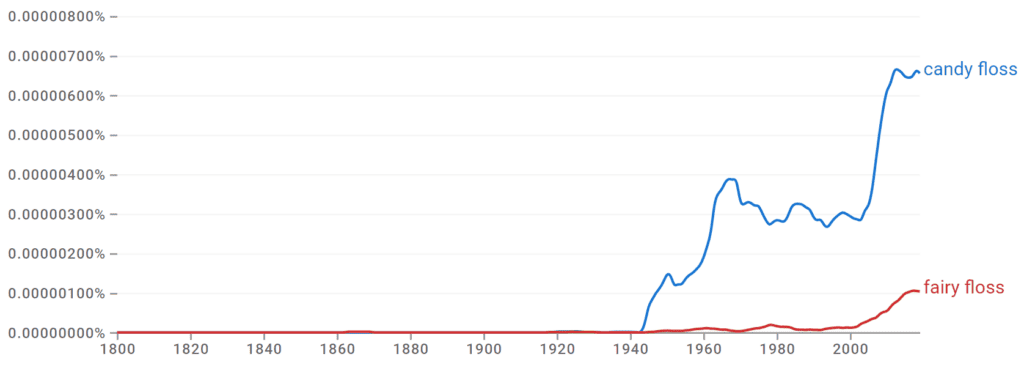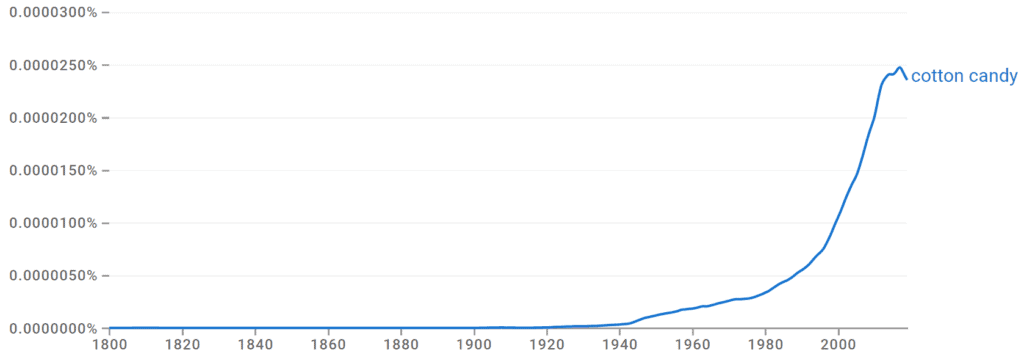It’s time for the grand battle between candy floss and cotton candy. Which one is correct, and are they meant to be hyphenated? Knowing how to properly describe this fluffy, sweet treat is essential if you wish to be grammatically and regionally correct. So, let’s take a look at the difference between cotton candy and candy floss together.
Candy Floss vs. Cotton Candy

Despite their different monikers, candy floss and cotton candy are exactly the same thing: a delightful, fluffy cloud of spun sugar, lighter than air, that somehow manages to stick to your fingers, face and clothes within seconds of eating it.

The only difference between these two terms is the Atlantic Ocean. In the UK and some parts of the Commonwealth, it’s known as candy floss or fairy floss. But Americans will look at you like you have two heads if you ask for candy floss at a fair or carnival because it’s cotton candy to them. The same goes up here in Canada.
Origin and Etymology of Cotton Candy

The invention of cotton candy, or should we say its machine, is credited to a dentist (of all people) and a confectioner. William Morrison and John C. Wharton patented the Electric Candy Machine in 1897 and introduced the cotton candy maker and sugary treat to the world at the 1904 World’s Fair as Fairy Floss.
Somehow, the name morphed into cotton candy in the US, while the UK held onto the fairy notion and chose candy floss instead. The Australians, not to be left out, still call it fairy floss.
Synonyms for Cotton Candy
Need more ways to describe this spun sugar delight? Here you go!
- Fairy floss (primarily in Australia and certain parts of the UK)
- Papa’s beard (In France, it’s called “Barbe à papa,” which translates to papa’s beard.)
- Old woman’s hair (In Greece, it’s hilariously called “γιαγιάς μαλλί,” which translates to grandma’s hair.)
- Ghost’s breath (in Africa)
Cotton Candy Examples in a Sentence

Let’s take a whirl around the world with different versions of cotton candy in a handful of sentences.
- The summer carnival isn’t complete without a huge stick of cotton candy in my hand.
- Jack was at the carnival, his face smeared with the pink, sticky fluff of candy floss.
- The dessert was presented with a halo of fairy floss, adding a playful touch to the unique dish.
- I couldn’t resist a sweet mouthful of papa’s beard—the French really know their cotton candy.
- The ghost’s breath dessert was light, fluffy and sweet, just like our cotton candy in America!
Cottony Goodness
Whether you call it classic cotton candy, candy floss or ghost’s breath, we can all agree on one thing: it’s a wonderfully sweet treat that dissolves in your mouth and leaves you wanting more. Remember, wherever you are in the world, cotton candy is a universal term, but some regions may not recognize what you’re referring to, so try and remember the different versions of this term around the globe!
Check out some other articles we covered:

Comments are closed.